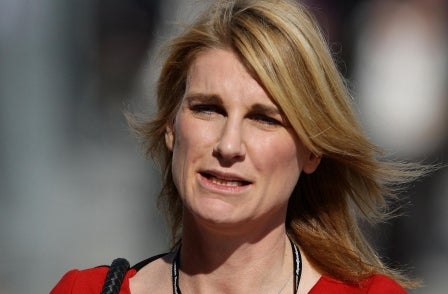
A tweet by Commons Speaker's wife Sally Bercow pointed "the finger of blame" at Tory peer Lord McAlpine during a media frenzy over allegations of child sex abuse, a judge has was told today.
Bercow was at the High Court for a hearing to decide the meaning of the allegedly libellous tweet, posted two days after a November Newsnight report wrongly implicated the former Conservative Party treasurer in claims about events at Bryn Estyn children's home in the 1970s and 1980s.
She has always denied that the tweet – "Why is Lord McAlpine trending? *Innocent face*" – was defamatory.
McAlpine, who has already received six-figure payouts from the BBC and ITV, is claiming damages from Mrs Bercow, and says the message meant that he was a paedophile who was guilty of sexually abusing boys living in care.
His counsel, Sir Edward Garnier QC, told Mr Justice Tugendhat that it would be difficult to think of a more serious meaning than the one advanced by McAlpine, who was not in court.
McAlpine's case was founded on the circumstances in which Mrs Bercow decided to tweet the peer's name – the media frenzy over a story that spread "like wildfire".
It was also necessary to consider the words themselves, in isolation.
"The tweet, by itself, suggests that 'Lord McAlpine' has done something wrong. Drawing attention to someone and then adding the expression 'innocent face' hints at wrongdoing and negates any suggestion that the tweet was a neutral query to which the defendant was looking for an answer. The inclusion of the words 'innocent face' was giving a nudge and a wink to readers," Sir Edward said.
"A Twitter-user was not someone who ignored what was happening in the world – he or she, far from being a hermit or shut off from the media, was inquisitive and IT literate, he said, adding: "In short, there was a prominent and salacious story in the media, and what was missing was the name of the abuser at its centre."
Sir Edward said that, against the backdrop of almost saturation news coverage, Bercow tweeted McAlpine's name – a man who fitted the description of the unnamed person at the centre of the controversy.
The addition of "innocent face" underpinned the connection of him to wrongdoing and the hypothetical reasonable reader would have put two and two together and understood the connection to the abuse allegations, he added.
"Put another way, what was the tweet about, if it was not pointing the finger of blame at Lord McAlpine?"
Bercow's counsel, William McCormick QC, has told the judge that she promptly tweeted her apologies, provided letters apologising for the distress caused and making clear that the underlying allegations were untrue, and made an offer to settle the case which had not been withdrawn.
He said that the tweet posed a question and contained an implied statement of fact that McAlpine was trending, but this was entirely neutral and no more objectionable than the statement to precisely the same effect on the Twitter homepage.
The words and punctuation of "innocent face" were merely an indication that the question should be read with a deadpan emphasis or tone, comparable with stage directions such as sotto voce or a notation on a musical score.
McAlpine's distress at the tweet was entirely comprehensible on a human level, he added.
Bercow drew attention to the fact that he was trending but if readers of the tweet were prompted by the question she posed to find tweets which defamed the peer, that was not a matter which should lead to damages against her.
It was not accepted that the background events to the claim were notorious general knowledge.
McAlpine's career, distinguished as it was, ended 20 years ago and the Newsnight broadcast, while of real interest to some, did not attract a particularly large audience.
The evidence of publicity given to the allegations fell far short of proving that on the day of the tweet – November 4, 2012 – the fact of the Newsnight allegations, let alone the description of the individual concerned, was general knowledge.
The extent and nature of the coverage changed markedly the day after the tweet following an interview with the Prime Minister on ITV and then again after the retraction of the original allegation by Newsnight's source.
"Whereas later coverage might fairly be described as `blanket' and such as to make the events `notorious' or general knowledge, this was not so at the time of the tweet," McCormick said.
Even if the tweet was to be taken as referring to some form of controversy surrounding Lord McAlpine, it was a form of reportage, making no attempt to take a side in that controversy, but merely noting that it existed, he told the judge.
Mr Justice Tugendhat has reserved his decision.
Email pged@pressgazette.co.uk to point out mistakes, provide story tips or send in a letter for publication on our "Letters Page" blog
